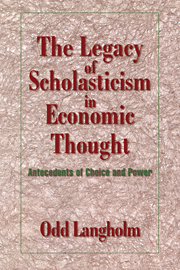Crossref Citations
This Book has been
cited by the following publications. This list is generated based on data provided by Crossref.
Houdt, Toon Van
1999.
The Economics of Art in Early Modern Times: Some Humanist and Scholastic Approaches.
History of Political Economy,
Vol. 31,
Issue. Supplement,
p.
301.
Negrón, Zarinés
1999.
Francisco Pacheco: Economist for the Art World.
History of Political Economy,
Vol. 31,
Issue. Supplement,
p.
31.
GRAHAM, PHILIP
2000.
Hypercapitalism.
New Media & Society,
Vol. 2,
Issue. 2,
p.
131.
Noell, Edd S.
2001.
In Pursuit of the Just Wage: A Comparison of Reformation and Counter-Reformation Economic Thought.
Journal of the History of Economic Thought,
Vol. 23,
Issue. 4,
p.
467.
Wood, Diana
2002.
Medieval Economic Thought.
Priddat, Birger P.
2002.
Transkulturelle Wertekonflikte.
p.
75.
Graham, Phil
2003.
Critical Discourse Analysis.
p.
110.
Graham, Phil
2003.
Critical Discourse Analysis.
p.
110.
Vivenza, Gloria
2004.
Renaissance Cicero. The 'economic' virtues ofDe OfficiisI, 22 in some sixteenth century commentaries.
The European Journal of the History of Economic Thought,
Vol. 11,
Issue. 4,
p.
507.
Drakopoulos, S.
and
Gotsis, G.N.
2004.
A Meta-theoretical Assessment of the Decline of Scholastic Economics.
History of Economics Review,
Vol. 40,
Issue. 1,
p.
19.
Barrera, Albino
2005.
Economic Compulsion and Christian Ethics.
Roncaglia, Alessandro
2005.
The Wealth of Ideas.
De-Juan, Oscar
and
Monsalve, Fabio
2006.
Morally ruled behaviour: The neglected contribution of Scholasticism.
The European Journal of the History of Economic Thought,
Vol. 13,
Issue. 1,
p.
99.
Langholm, Odd
2006.
Monopoly and Market Irregularities in Medieval Economic Thought: Traditions and Texts to A.D. 1500.
Journal of the History of Economic Thought,
Vol. 28,
Issue. 4,
p.
395.
Mews, Constant J.
and
Abraham, Ibrahim
2007.
Usury and Just Compensation: Religious and Financial Ethics in Historical Perspective.
Journal of Business Ethics,
Vol. 72,
Issue. 1,
p.
1.
DODD, SARAH DRAKOPOULOU
and
GOTSIS, GEORGE
2007.
LABOUR IS HOLY BUT BUSINESS IS DANGEROUS: ENTERPRISE VALUES FROM THE CHURCH FATHERS TO THE REFORMATION.
Journal of Enterprising Culture,
Vol. 15,
Issue. 02,
p.
133.
Langholm, Odd
2007.
S. M. Ghazanfar (Ed), Medieval Islamic Economic Thought: Filling the “Great Gap” in European Economics (London and New York: Routledge/Curzon, 2003) pp. xv, 284, ISBN 0-415-29778-8..
Journal of the History of Economic Thought,
Vol. 29,
Issue. 4,
p.
508.
Boldizzoni, Francesco
2008.
Means and Ends.
p.
8.
Walsh, Adrian
and
Lynch, Tony
2008.
The Morality of Money.
p.
91.
Theocarakis, Nicholas J.
2008.
Antipeponthos and reciprocity: the concept of equivalent exchange from Aristotle to Turgot.
International Review of Economics,
Vol. 55,
Issue. 1-2,
p.
29.





